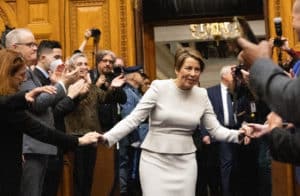
Gov. Maura Healey enters the state House of Representatives' chamber for her inauguration on Jan. 5, 2023. State House News Service photo
Maura Healey took the oath of office as the 73rd governor of Massachusetts at 12:32 p.m. Thursday, ascending to the state’s top job after two terms as attorney general and pledging to tackle challenges like housing, cost of living, transportation and climate change.
“We have untold wealth in Massachusetts. But record public revenue does little good when families can’t pay the rent, or buy a house, or heat their homes, or hire child care. Our health system is the envy of the world. Yet our hospitals are desperate for staff,” Healey said in her inaugural remarks.
She added, “Our companies are eager to expand, but they can’t find workers with the skills they need. Communities and people are yearning to grow and thrive, but they haven’t been given the tools to do it. This is the greatest state in the union. But people are leaving at some of the highest rates in the country, giving up on the Massachusetts story.”
Drawing on the theme of Massachusetts as a home for all of its residents, the Democrat who grew up in New Hampshire asked Bay Staters to help her “chart a path forward and walk it together, into the next chapter of our Massachusetts story” and look hard at their local zoning codes for ways to build more housing.
Healey, 51, had been considered the Democrats’ odds-on favorite to become the state’s chief executive for almost the entirety of her two terms as attorney general. She won 1,584,403 votes in the November general election, easily topping Republican Geoff Diehl in the race to succeed Republican Gov. Charlie Baker, a popular chief executive who opted against seeking a third term.
In addition to being the first woman and first openly gay person elected governor in Massachusetts, Healey’s inauguration makes her the first out lesbian governor to take office in any state in America. She is also the first sitting Massachusetts attorney general elected to the corner office since attorney general became an elected, not appointed, office more than a century ago and just the third Democrat elected governor of the Bay State over the last 40 years.
She briefly acknowledges, but downplays, in her inaugural speech the historic nature of her ascension to the state’s highest office and the many firsts that it represents.
“But every one of us, every citizen, is a first. You may be a first-generation immigrant, choosing Massachusetts as the foundation of your American dream. You may be the first in your family to go to college, or to send your child there. The first in your neighborhood to start a business,” Healey says. “In this state, we are all trailblazers. We are all leaders. That’s why we live in Massachusetts. What story will we write together?”
After a campaign during which she was criticized for being light on details, Healey makes a handful of firm commitments in her inaugural address to a joint session of the House and Senate, and to the people of Massachusetts. She pledges to:
- Create a standalone secretary of housing to “work across government and support every city and town to make sure we meet our goals” within her first 100 days;
- Have her administration and finance secretary “identify unused state-owned land and facilities that we can turn into rental housing or homes within one year;”
- Expand tax deductions for renters;
- Include in her first budget proposal a “MassReconnect” program to make community college free for people 25 and older without a college degree;
- Increase funding to the state university system;
- Appoint a safety chief at the MBTA within 60 days;
- Fund the hiring of 1,000 new workers to focus on the operation of the MBTA within her first year;
- Form an interagency task force dedicated to competing for federal infrastructure money;
- Direct each agency under her administration to conduct a full equity audit;
- Double the state’s offshore wind and solar power procurement targets, and quadruple energy storage deployment;
- Electrify the state’s public vehicle fleet and put a million electric vehicles on the road by 2030; and
- Commit at least 1 percent of the state’s budget to environmental and energy agencies, triple the budget of the Massachusetts Clean Energy Center, and create a “green bank” to invest in resilient infrastructure and to attract new businesses to Massachusetts.






